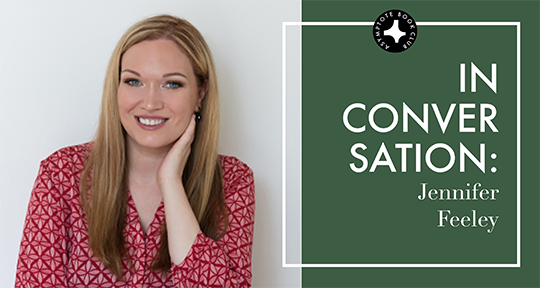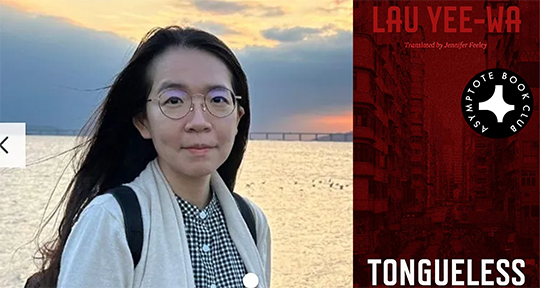Jennifer Feeley is the Anglophone voice of renowned Hong Kong writers such as Xi Xi 西西, Wong Yi 黃怡, and Lau Yee-Wa 劉綺華—whose thrilling and chilling Tongueless is our Book Club selection for June 2024. Set in a vividly multilingual Hong Kong, Tongueless is a heartrending horror novel about the human face of language disappearance, and what it means when we no longer have the words to speak to one another. Despite the contemporary social and political alienation depicted in this vivid novel, Sinophone Hong Kong literature is flourishing in English, German, Italian, and other European languages, testifying to the diversity and dynamism of the Hong Kong literary scene. Asymptote is grateful to Jennifer Feeley for her humour as she shares the process of translating Tongueless; her generosity in recounting the complex heritage of literary Chinese(s); and her commitment to championing stories from Hong Kong for global readers.
The Asymptote Book Club aspires to bring the best in translated fiction every month to readers around the world. You can sign up to receive next month’s selection on our website for as little as USD20 per book; once you’re a member, join our Facebook group for exclusive book club discussions and receive invitations to our members-only Zoom interviews with the author or the translator of each title.
Michelle Chan Schmidt (MCS): How did your interest in Hong Kong literature arise?
Jennifer Feeley (JF): In the summer of 2005, I attended a poetry conference in Beijing, where I met the Hong Kong writer and scholar Leung Ping-kwan 梁秉鈞, also known as Yasi/ Yesi 也斯, or PK Leung. When PK came back from his trip to the mainland, he spent an entire day showing me around, and we talked a lot about Hong Kong poetry.
He recommended the work of Yau Ching 游靜—who’s also a filmmaker—and suggested that I also take a look at her film Ho Yuk 好郁 (Let’s Love Hong Kong), one of the earliest lesbian films from Hong Kong. Later in my graduate school career, an essay I wrote on Yau Ching’s poetry became my first academic publication. That was when I really started to consider Hong Kong literature—particularly poetry—and its genealogy. How do we define and categorise Hong Kong poetry? Can we do it by language?
As an academic at the University of Iowa, I taught Hong Kong cinema and literature, and began to write about Hong Kong film and research musical films from the 1960s. As I noted that a significant amount of Hong Kong literature had yet to be translated into English, I became increasingly frustrated. Even when translations existed, many were not available outside Hong Kong. For instance, I wanted to teach Eva Hung’s translation of Xi Xi’s My City《我城》, which was published by Renditions in Hong Kong in 1993, but the bookstore was unable to order it. I could only teach part of the novel through PDF versions of my copy, due to copyright restrictions.
When I finally bought a copy of Xi Xi’s Selected Poems, I fell in love with her work: her language was such a challenge. Purely for fun, I began to translate them. Shortly after, I was approached by an editor from Zephyr Press, who invited me to translate a book by an excellent Mainland Chinese poet. I liked this poet, but I was so in love with Xi Xi’s poetry that I decided to take a risk. I translated a sample of her work, and they obtained the rights to publish it. READ MORE…




